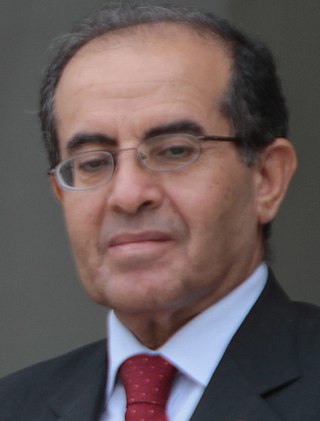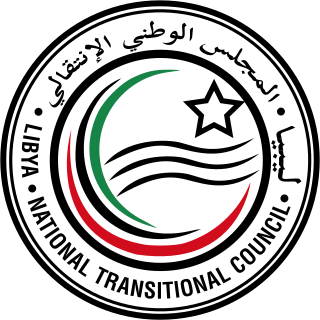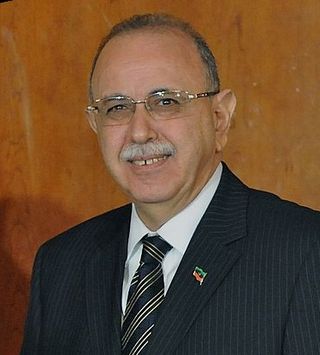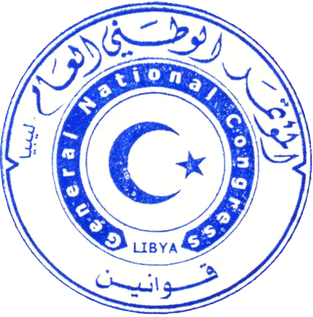
The politics of Libya has been in an uncertain state since the collapse of the Libyan Arab Jamahiriya in 2011 and a recent civil war and various jihadists and tribal elements controlling parts of the country.
A provisional government, also called an interim government, an emergency government, a transitional government or provisional leadership, is a temporary government formed to manage a period of transition, often following state collapse, revolution, civil war, or some combination thereof.
Ali Abd-al-Aziz al-Isawi is a Libyan politician who is a leading figure of the National Transitional Council of Libya and was the vice-chairman of the executive board of the NTC until his dismissal along with the board's other ministers on 8 August 2011. He previously served as the Minister of Foreign Affairs for the NTC. He also was secretary of the General People's Committee of Libya (GPCO) for Economy, Trade and Investment, and was the youngest minister to fill such a post. He was appointed to this post in January 2007. Before taking the ministerial position, he founded the Centre for Export Development in 2006 and became the first director general for it. He also assumed the position of director general for the Ownership expansion program in 2005. He began his political career as a staff member and then as a diplomat in the Foreign Ministry until 2005.

Mustafa Abdul Jalil is a Libyan politician who was the Chairman of the National Transitional Council from 5 March 2011 until its dissolution on 8 August 2012. This position meant he was de facto head of state during a transitional period after the fall of Muammar Gaddafi's government in the Libyan Civil War, and until the handover of power to the General National Congress.

The anti-Gaddafi forces, also known as the Libyan opposition or Libyan rebels, were Libyan groups that opposed and militarily defeated the government of Muammar Gaddafi during the First Libyan Civil War in 2011, killing him in the process. The Anti-Gaddafi forces were represented by the National Transitional Council and their National Liberation Army, which claimed to be the "only legitimate body representing the people of Libya and the Libyan state". These opposition forces included organized and armed militia groups, participants in the Libyan Civil War, Libyan diplomats who switched their allegiance from the Gaddafi-led government, and Libyan military units that switched sides to support the protesters.

The National Transitional Council (NTC) was a transitional government established in the 2011 Libyan civil war. The rebel forces overthrew the Libyan Arab Jamahiriya of Muammar Gaddafi. The NTC governed Libya for a period of ten months after the end of the war, holding elections to a General National Congress on 7 July 2012, and handing power to the newly elected assembly on 8 August.

Mahmoud Jibril el-Warfally, also transcribed Jabril or Jebril or Gebril, was a Libyan politician who served as the interim Prime Minister of Libya for seven and a half months during the overthrow of Muammar Gaddafi and the Libyan Civil War, chairing the executive board of the National Transitional Council (NTC) from 5 March to 23 October 2011. He also served as the Head of International Affairs. As of July 2012, Jibril was the head of one of the largest political parties in Libya, the National Forces Alliance.
Omar Mokhtar El-Hariri was a leading figure of the National Transitional Council of Libya who served as the Minister of Military Affairs in 2011, during the Libyan Civil War. He controlled the National Liberation Army and the Free Libyan Air Force from March to May 2011. He served on the council Executive Board before being replaced by Jalal al-Digheily, and he headed Military Affairs in the unicameral National Transitional Council legislature.

Ali Abdussalam Tarhouni is a Libyan economist and politician. Tarhouni served as the minister for oil and finance on the National Transitional Council, the provisional governing authority in Libya, from 23 March to 22 November 2011. He acted in the capacity of interim prime minister of Libya during the departure of outgoing incumbent Mahmoud Jibril from 23 October 2011 until Abdurrahim El-Keib was formally named to succeed Jibril on 31 October.
Jalal Muhammad Mansur al-Digheily, sometimes transliterated al-Dogheily, is a Libyan politician who served as the Defence Minister of Libya under the National Transitional Council during the 2011 Libyan civil war. Digheily succeeded Omar El-Hariri no later than 19 May 2011 after the latter was relieved over ongoing tensions with General Abdul Fatah Younis, then the National Liberation Army chief. Though El-Hariri held the title of Minister of Military Affairs, virtually all sources have referred to Digheily as the Defence Minister of the National Transitional Council. He was fired along with 14 other members of the 16-person Executive Board on 8 August 2011, but was reappointed in early October 2011 after continuing in the role of interim defence minister for almost two months. When Prime Minister Abdurrahim El-Keib announced his cabinet on 22 November 2011, Digheily was excluded in favor of Zintan Brigade commander Osama al-Juwali.

Anwar Elfeitori is a Libyan Telecommunications Engineer born on 1964 in Benghazi, Libya. Elfeitori served as the minister for Transportation and Communication on the executive office of the National Transitional Council, from 10 May 2011 to 22 November 2011. He was named Minister for Communications and Information Technology on 22 November 2011 by Abdurrahim El-Keib.

The aftermath of the 2011 Libyan civil war has been characterized by marked change in the social and political order of Libya after the overthrow and killing of Muammar Gaddafi in the civil war that was fought in Libya in 2011. The country has been subject to ongoing proliferation of weapons, Islamic insurgencies, sectarian violence, and lawlessness, with spillovers affecting neighboring countries including Mali.

Abdurrahim Abdulhafiz El-Keib, PhD, was a Libyan politician, professor of electrical engineering, and entrepreneur who served as interim Prime Minister of Libya from 24 November 2011 to 14 November 2012. He was appointed to the position by the country's National Transitional Council on the understanding that he would be replaced when the General National Congress was elected and took power. Power was handed to the Congress on 8 August 2012, and the assembly appointed El-Keib's successor Ali Zeidan in October 2012.

Mustafa A. G. Abushagur is a Libyan politician, professor of electrical engineering, university president and entrepreneur. He served as interim Deputy Prime Minister of Libya from 22 November 2011 to 14 November 2012 in Abdurrahim El-Keib's cabinet and was briefly elected to succeed El-Keib as Prime Minister in 2012, before failing to receive congressional approval for his cabinet nominees and being removed from office.
Abdulrahman Ben Yezza is a Libyan businessman and politician who is the Oil Minister in the government of Abdurrahim El-Keib. Prior to the 2011 Libyan Civil War, Ben Yezza served as "chairman of the operator's management committee" for Italian oil company Eni. He also worked for Libya's National Oil Corporation during Libya's governance by Muammar Gaddafi, but he quit the company voluntarily due to reported differences with its then-leader Shokri Ghanem, a member of Gaddafi's inner circle. In 2014 the Libyan government has named Abdulrahman Ben Yezza as chairman of the Libyan Investment Authority (LIA). He temporarily replaced AmbdulMagid Breish who had to step out pending investigation into his role in the Gaddafi administration.

Abdurrahman Habil, PhD, (Arabic is a lawyer and Libyan politician. He was named Minister of Culture and Civil Society on 22 November 2011 by Abdurrahim El-Keib.
Isa Tuwaijir (Arabic is a mechanical engineer and a Libyan politician born in the city of Tripoli in 1957. He was named Finance Minister on 22 November 2011 by Abdurrahim El-Keib.

The General National Congress or General National Council was the legislative authority of Libya for two years following the end of the First Libyan Civil War. It was elected by popular vote on 7 July 2012, and took power from the National Transitional Council on 8 August.

The Libyan House of Representatives is the legislature of Libya resulting from the 2014 Libyan parliamentary election, which had an 18% turnout. On 4 August 2014, in the course of the progressing August 2014 Islamist coup in the capital Tripoli in the context of the Libyan Civil War, the House of Representatives relocated itself to Tobruk in the far east of Libya. Several HoR sessions were held in Tripoli in May 2019 while Tripoli was under armed attack, electing an Interim Speaker for 45 days. Between 2014 and 2021, the House of Representatives supported the Tobruk-based government led by Abdullah al-Thani before supporting the incumbent Government of National Unity led by Abdul Hamid Dbeibeh. In September 2021, the House of Representatives passed a no-confidence motion against the interim GNU government and later appointed a rival Government of National Stability (GNS).

Abdul Hamid Muhammad Abdul Rahman al-Dbeibeh is a Libyan politician and businessman who is the prime minister of Libya under the Government of National Unity (GNU) in Tripoli. Dbeibeh was appointed on 15 February 2021 through the Libyan Political Dialogue Forum, and he was expected to hold the office until elections on 24 December 2021, which were later postponed.












